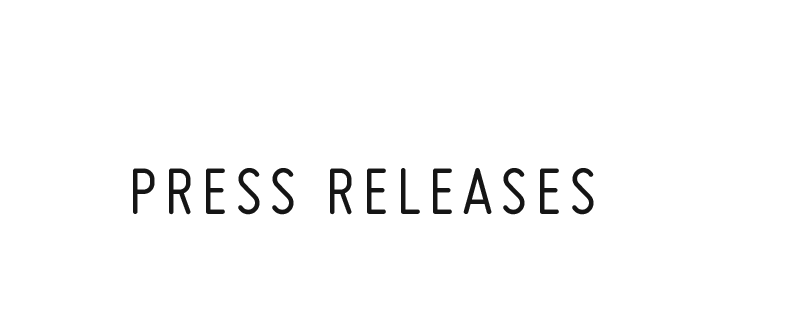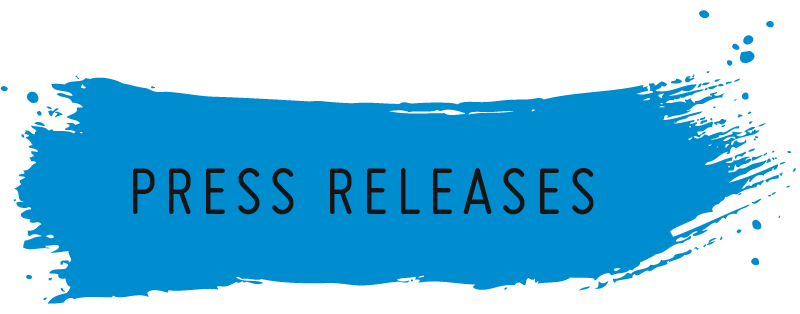- 3D Print Bureau
- 6K
- Agmatix
- Airwayz
- AM-Flow
- Appadda
- Caracol
- CG Trader
- CyberOptics
- e-Xstream
- GenCell
- GreenEye
- Impossible Objects
- Incus Media
- InkBit
- ITG
- JPB Systeme
- KeyProd
- Landa
- LEO Lane
- Lumet
- Magic Software
- MakerBot
- Marketiger
- Nano Dimension
- Paragon Rapid Technologies
- PearlX
- Plant & Bean
- Redefine Meat
- Replique
- Ripples
- Sakuu Corporation
- SolarEdge
- StoreDot
- Stratasys
- Sunrock
- The Bespoke Group
- Trigo
- UltiMaker
- Xjet
Polymaker Qualifies New Industrial Polycarbonate Materials for MakerBot LABS Experimental Extruder
Polycarbonate (PC) materials specifically designed for industrial 3D printers with a heated chamber
New materials bring strong mechanical and thermal properties to METHOD X 3D printer for a wide range of engineering applications
BROOKLYN, N.Y., Sept. 17, 2020 – MakerBot, a global leader in 3D printing and subsidiary of Stratasys Ltd. (Nasdaq: SSYS), today announces that Polymaker, a leading provider of 3D printing materials, has qualified three polycarbonate materials for MakerBot LABS™ for the MakerBot METHOD X™ 3D printer.
Polymaker™ PC-PBT, PolyMax™ PC-FR, and PolyLite™ PC are available to print on the METHOD X 3D printer with the MakerBot LABS Experimental Extruder. This extruder turns METHOD into an open materials platform, enabling users to print with a wide variety of third-party materials on an industrial 3D printing platform. The latest material additions from Polymaker to the LABS portfolio aim to enable METHOD X users to harness the strong mechanical and thermal properties of polycarbonate (PC), while reducing problems such as warping and curling that typically occur when used with conventional desktop 3D printing machines.
Polycarbonate is a popular high-performance engineering material that possesses a unique balance of toughness, good light transmission, high heat resistance, and excellent electrical resistance. It is lightweight, has the ability to transmit light as effectively as glass, and withstand impacts better than other thermoplastics such as ABS. Due to these properties, PC materials are commonly used for functional prototyping and end-use parts in the production of automotive components, protective gear, medical device components, and exterior lighting fixtures.
However, polycarbonate can be challenging to print due to its ability to contract if it is cooled too quickly, which can cause warping and shrinkage of the printed part. Controlling the ambient temperature, such as with a heated chamber, is one of the most critical factors when printing polycarbonate.
The MakerBot METHOD X 3D printer is the only printer in its price class with a heated chamber that reaches up to 110°C, letting the parts cool down gradually to minimize curling and warping. METHOD controls how fast a part cools down during the printing process, allowing it to print polycarbonate and other advanced materials more successfully than typical desktop 3D printers that only have a heated build plate. In addition, with the moisture sensitivity of PC materials, Polymaker recommends using a material caddy, such as the Polymaker PolyBox™, to safeguard them from precipitation in the environment. MakerBot METHOD™ users can also use the Material Drying mode on the METHOD X to remove moisture from the materials.
“Polycarbonate is often the choice for parts that function in demanding applications. Its mechanical properties, flame retardance, and chemical resistance also allow engineers to push the boundaries of their 3D printed parts and experiment with new geometries,” said Xiaofan Luo, PhD, President of Polymaker. “Anyone who is serious about printing polycarbonate knows that a heated chamber is essential for printing large and strong complex parts. METHOD is bringing industrial capabilities to a desktop machine, and we think its users will really benefit from the material properties our PC range offers.”
“With its up to 110°C heated chamber, METHOD is a powerful and unique 3D printer platform for printing advanced engineering materials. The availability of Polymaker’s PC materials on METHOD offers allows engineers to print polycarbonate parts that they previously had to outsource to more expensive industrial 3D printers,” said Johan-Till Broer, VP of Product Development, MakerBot. “We are seeing increased interest in industrial materials as engineers advance from simple prototyping to 3D printing end-use parts. We are thrilled that Polymaker has qualified its industrial range of PC materials for MakerBot LABS.”
The addition of Polymaker polycarbonate materials brings the MakerBot LABS for METHOD portfolio of materials to nine and the total number of materials available on the METHOD platform to 19. The newly qualified polycarbonate materials from Polymaker include:
- Polymaker PC-PBT: This polymer blend combines the good chemical resistance of PBT (polybutylene terephthalate) with the strength and toughness of polycarbonate. Compared to PC resins and PC-ABS compounds, PC-PBT offers better resistance to chemicals, which enables printed applications where resistance to intermittent contact with fuels, oils, lubricants, or cleaners is necessary. It performs well under extreme circumstances, whether in contact with hydrocarbon-based chemicals or operating at subzero temperatures. Polymaker PC-PBT is a specialty material that maintains good toughness and natural ductile fracture behavior at low temperatures.
- PolyMax PC-FR: A flame retardant (FR) polycarbonate material, PolyMax PC-FR meets the UL-94 V0 standard, an important fire safety specification. The material displays excellent toughness, strength, and heat resistance, making it ideal for applications within the automotive, railway, and aerospace industries.
- PolyLite PC: PolyLite PC is produced using a polycarbonate resin specifically engineered for 3D printing. This material demonstrates a high modulus, making it ideal for applications that require good stiffness and light diffusion, such as outdoor light housings. PolyLite PC is available in transparent color, showing good optical clarity, rendering parts with an attractive crystal shine.
To further strengthen PC parts, Polymaker recommends annealing them right after the printing process to release the residual internal stress. The combination of METHOD’s heated chamber and annealing feature is designed to enable users to produce strong, manufacturing-grade parts.
Polymaker materials can be purchased on the Polymaker site.
The MakerBot LABS extruder enables users to print with a wide variety of third-party materials on METHOD as an open materials platform, expanding the possibilities of applications. MakerBot offers a wide range of industrial materials through MakerBot LABS, and is continuing to identify additional advanced materials for the platform. Partners in the MakerBot LABS Materials Development Program include BASF 3D Printing Solutions, Jabil, Kimya, LEHVOSS Group, Mitsubishi Chemical, and Polymaker.
For more information, visit www.makerbot.com/method.
-
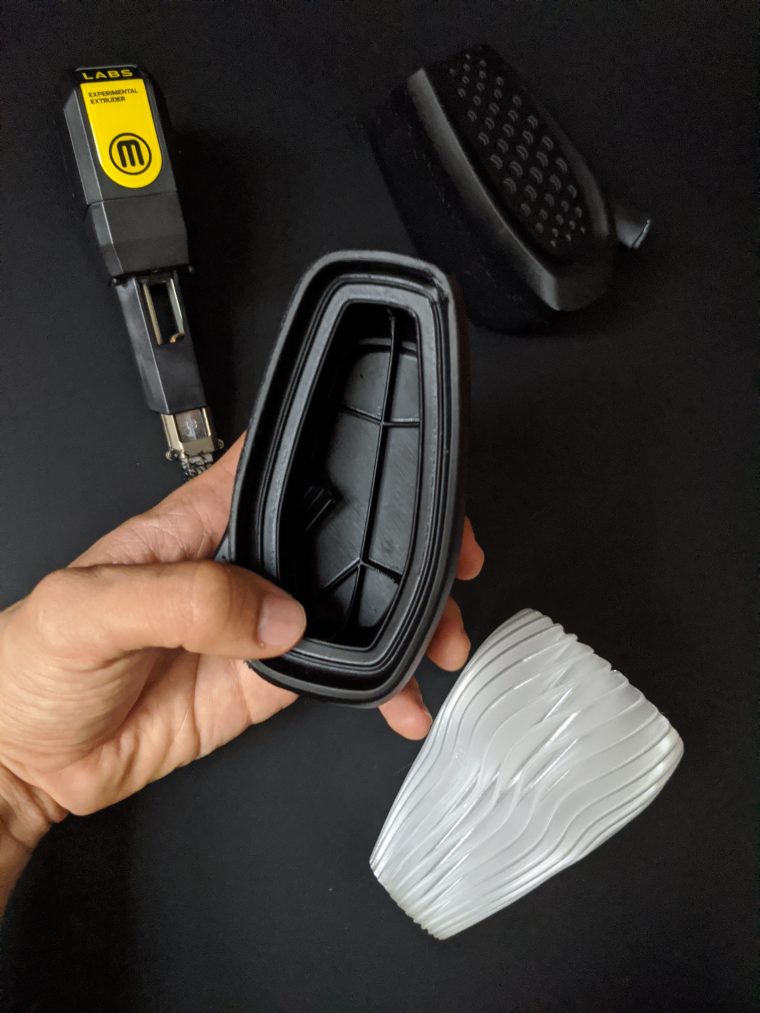 MakerBot LABS Workspace
MakerBot LABS Workspace
Click here to download 300dpi images -
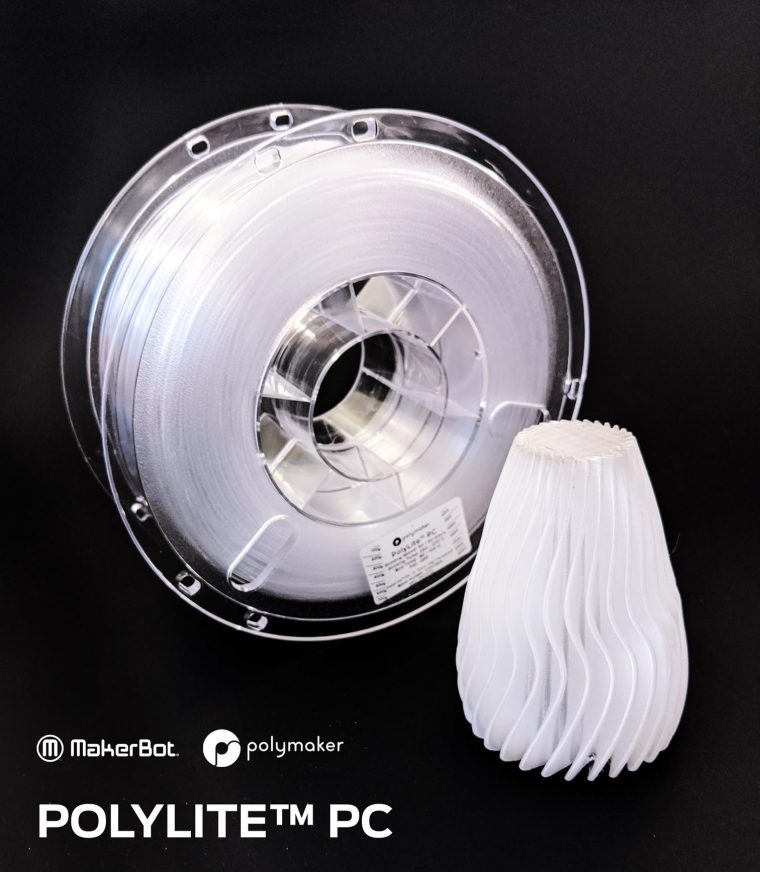 PolyLite PC Lampshade
PolyLite PC Lampshade
Click here to download 300dpi images -
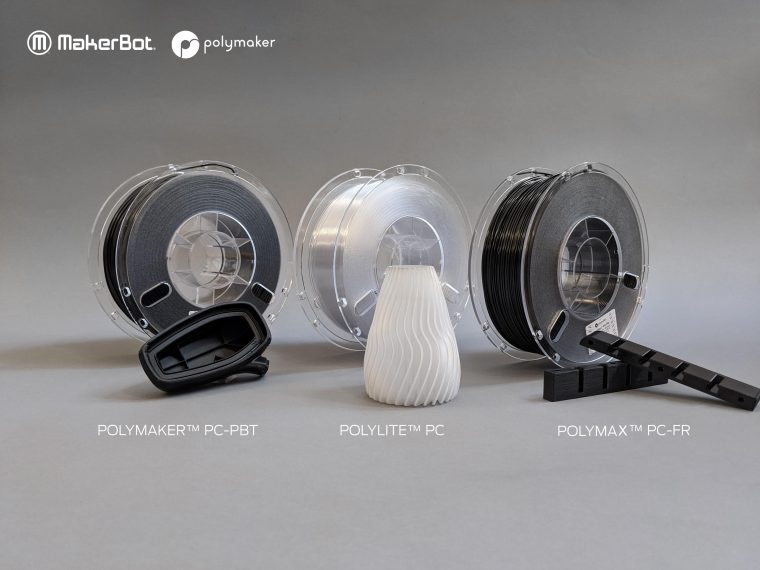 Polymaker PC Materials
Polymaker PC Materials
Click here to download 300dpi images -
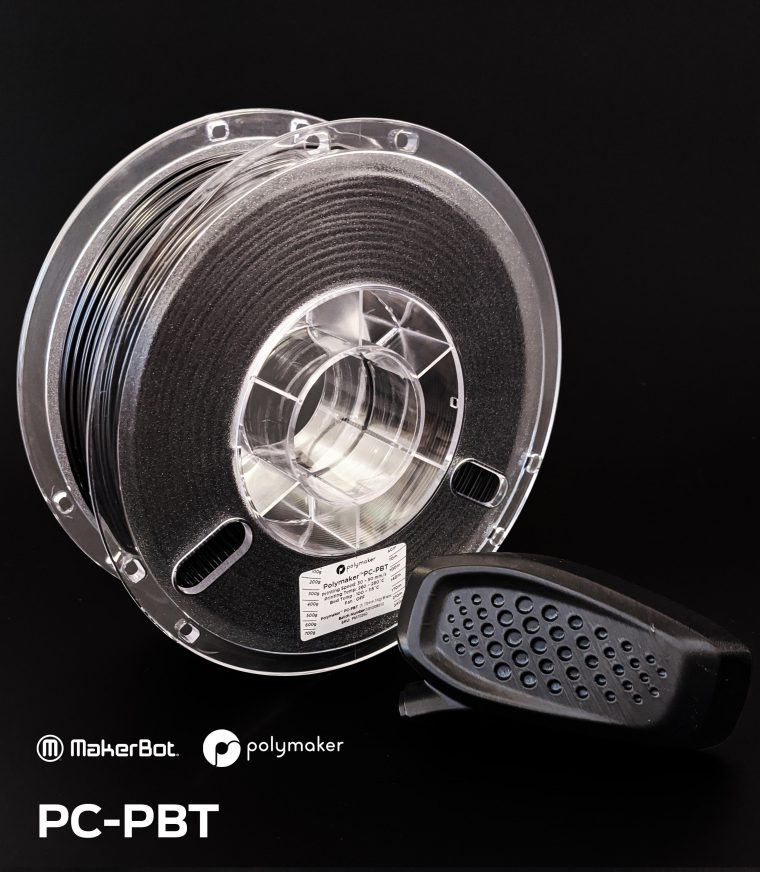 Polymaker PC-PBT Left-hand wing mirror model
Polymaker PC-PBT Left-hand wing mirror model
Click here to download 300dpi images -
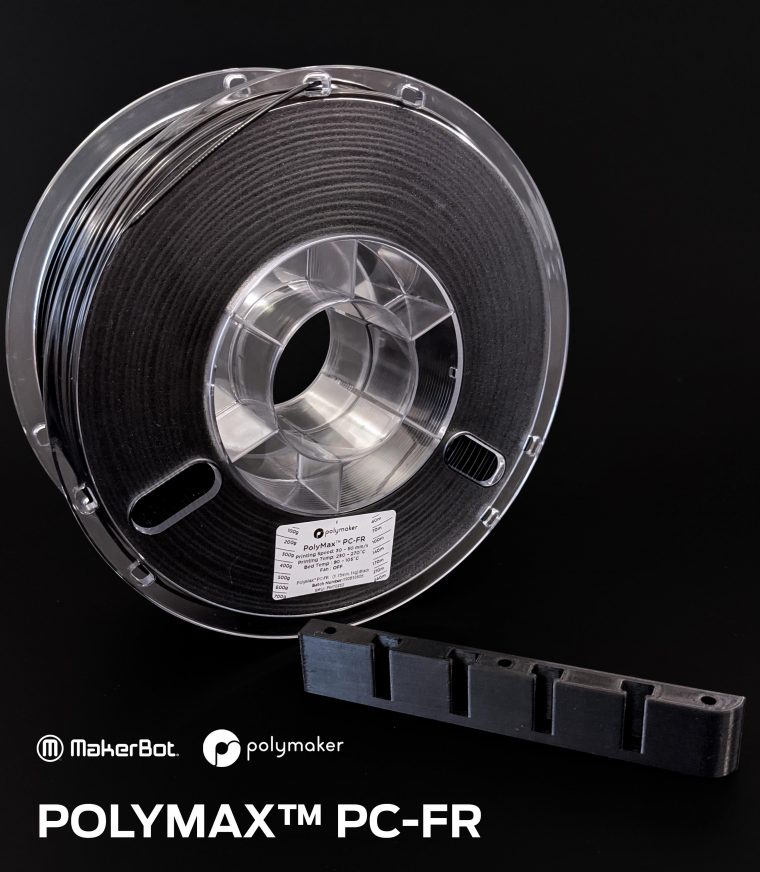 PolyMax PC-FR Battery clip bracket
PolyMax PC-FR Battery clip bracket
Click here to download 300dpi images
Polymaker qualifie de nouveaux matériaux en polycarbonate industriels pour l’Extrudeuse Expérimentale MakerBot LABS
Matériaux en polycarbonate (PC) spécialement conçus pour les imprimantes industrielles 3D dotées d’une enceinte chauffée
Les excellentes propriétés mécaniques et thermiques de ces nouveaux matériaux étendent la gamme des applications d’ingénierie disponibles pour l’imprimante 3D METHOD X.
BROOKLYN, New York, 22 septembre 2020 – MakerBot, leader mondial de l’impression 3D et filiale de Stratasys (Nasdaq : SSYS), annonce aujourd’hui que Polymaker, , fournisseur leader de matériaux d’impression 3D, a qualifier trois matériaux en polycarbonate pour l’extrudeuse MakerBot LABS™ pour l’imprimante 3D MakerBot METHOD X™.
Polymaker™ PC-PBT, PolyMax™ PC-FR et PolyLite™ PC sont désormais disponibles pour imprimer sur la METHOD X avec l’Extrudeuse Expérimentale MakerBot LABS. Celle-ci transforme METHOD en une plateforme de matériaux ouverte, permettant aux utilisateurs d’imprimer avec un large éventail de matériaux tiers sur une plateforme d’impression 3D industrielle. Avec ces derniers ajouts en date de matériaux à la gamme LABS, les utilisateurs de l’imprimante METHOD X bénéficieront des excellentes propriétés thermiques et mécaniques du polycarbonate tout en limitant les phénomènes de gauchissement et de retrait typiques des imprimantes 3D de bureau.
Le polycarbonate (PC) est un matériau d’ingénierie haute performance doté d’une rigidité élevée. Il diffuse bien la lumière, présente une grande résistance à la chaleur et constitue un bon isolant électrique. Il est également léger, peut diffuser la lumière aussi efficacement que le verre et offre une meilleure résistance aux impacts que d’autres thermoplastiques comme l’ABS. Au vu de ces propriétés, les matériaux en polycarbonate sont généralement destinés à la fabrication de pièces et de prototypes fonctionnels pour des composants automobiles, des équipements de protection, des pièces de matériel médical et des dispositifs d’éclairage en extérieur.
Cependant, le polycarbonate se rétracte s’il refroidit trop vite, provoquant alors un phénomène de retrait et de décollement de la pièce imprimée, ce qui peut rendre son impression plus difficile. Le contrôle de la température ambiante, par exemple avec une enceinte chauffée, constitue dès lors un facteur absolument primordial lors de l’impression sur le polycarbonate.
L’imprimante 3D MakerBot METHOD X est la seule dans son échelle de prix à être équipée d’une enceinte chauffée pouvant atteindre 110 °C, avec un refroidissement progressif des pièces pour limiter les phénomènes de retrait et de gauchissement. L’imprimante METHOD contrôle la vitesse de refroidissement des pièces pendant le processus d’impression, ce qui permet une meilleure impression du polycarbonate et d’autres matériaux techniques qu’avec les imprimantes 3D classiques ne disposant que d’une plaque de construction chauffée. En outre, compte tenu de la sensibilité à l’humidité des matériaux PC, Polymaker conseille d’utiliser un plateau de chargement des matériaux, tel que Polymaker PolyBox™, afin de les préserver de toute précipitation dans l’environnement. Les utilisateurs de MakerBot METHOD™ peuvent également utiliser le mode de Séchage Des Matériaux de la METHOD X pour éliminer l’humidité des matériaux.
« Le polycarbonate constitue souvent l’option de prédilection pour des éléments destinés à des applications exigeantes. Ses propriétés mécaniques et ignifuges, ainsi que sa résistance chimique permettent également aux ingénieurs de repousser les limites de leurs pièces imprimées en 3D et d’expérimenter avec de nouvelles géométries », explique le Dr Xiaofan Luo, président de Polymaker. « Tous ceux qui ne plaisantent pas avec l’impression du polycarbonate savent qu’une enceinte chauffée est essentielle pour l’impression d’éléments complexes solides et de grande taille. METHOD dote une machine de bureau de capacités industrielles et nous sommes d’avis que ces utilisateurs bénéficieront réellement des propriétés du matérielles offertes par notre gamme PC. »
« Avec son enceinte chauffée pouvant atteindre 110 °C, l’imprimante METHOD est une plateforme unique et puissante pour l’impression 3D de matériaux d’ingénierie avancés. La disponibilité des matériaux PC de Polymaker sur la METHOD permet aux ingénieurs d’imprimer des éléments en polycarbonate qu’ils devaient auparavant sous-traiter auprès d’imprimeurs 3D industriel plus onéreux », explique Johan-Till Broer, vice-président du développement produit chez MakerBot. « Nous constatons un intérêt accru pour les matériaux industriels, alors que les ingénieurs progressent d’un simple prototypage vers l’impression 3D de pièces finales. Nous sommes très heureux de la qualification de la gamme industrielle de matériaux PC de Polymaker pour l’extrudeuse MakerBot LABS. »
L’ajout des filaments en polycarbonate de Polymaker porte à neuf le nombre de matériaux disponibles pour l’extrudeuse MakerBot LABS pour METHOD, pour un total de 19 matériaux disponibles sur la plateforme METHOD. Les matériaux en polycarbonate de Polymaker ajoutés récemment sont notamment les suivants :
- PolymakerPC-PBT : ce mélange de polymères combine la résistance chimique du PBT (polybutylène téréphtalate) à la rigidité du polycarbonate. Par rapport aux résines PC ou aux composés PC-ABS, le PC-PBT offre une meilleure résistance aux produits chimiques, ce qui permet des applications imprimées qui nécessitent une résistance au contact intermittent avec des carburants, huiles, lubrifiants ou détergents. Par ailleurs, le PC-PBT se comporte bien dans des conditions extrêmes, en contact avec des produits chimiques dérivés d’hydrocarbures ou à des températures négatives. Le PC-PBT Polymaker est un matériau spécifique qui conserve une rigidité élevée et sa ductilité naturelle à basse température.
- PolyMax PC-FR: matériau en polycarbonate ignifugeant, le PolyMax PC-FR satisfait aux spécifications de la norme d’inflammabilité UL-94 V0. Il présente une rigidité et une solidité élevées, ainsi qu’une excellente résistance à la chaleur, ce qui en fait un matériau idéal pour les secteurs de l’aérospatiale, de l’automobile et du rail.
- PolyLite PC: le PolyLite PC est fabriqué à l’aide d’une résine de polycarbonate spécialement conçue pour l’impression 3D. Ce matériau présente une rigidité élevée, ce qui le rend idéal pour les applications qui nécessitent une bonne dureté et des propriétés de diffusion lumineuse, comme les boîtiers des éclairages en extérieur. Le PolyLite PC proposé est transparent, offrant une bonne clarté optique ce qui permet d’obtenir des modèles présentant un bel éclat cristallin.
Pour encore renforcer les pièces PC, Polymaker recommande de les tempérer dès la fin du processus d’impression afin de réduire la pression interne résiduelle. L’association de l’enceinte chauffée de la METHOD et de la fonction de tempérance permet aux utilisateurs de produire des pièces solides et d’excellente qualité.
Les matériaux Polymaker sont disponibles sur le site Polymaker.
L’extrudeuse MakerBot LABS donne à ses utilisateurs la possibilité d’imprimer un large éventail de matériaux tiers sur sa plateforme de matériaux ouverte METHOD, pour un large choix d’applications. MakerBot propose une vaste gamme de matériaux industriels pour l’extrudeuse MakerBot LABS et continue d’identifier de nouveaux matériaux pour la plateforme. Parmi les partenaires du programme de développement des matériaux MakerBot LABS, citons BASF 3D Printing Solutions, Jabil, Kimya, LEHVOSS Group, Mitsubishi Chemical et Polymaker.
Pour plus d’informations, consultez le site www.makerbot.com/method.
-
 MakerBot LABS Workspace
MakerBot LABS Workspace
Click here to download 300dpi images -
 PolyLite PC Lampshade
PolyLite PC Lampshade
Click here to download 300dpi images -
 Polymaker PC Materials
Polymaker PC Materials
Click here to download 300dpi images -
 Polymaker PC-PBT Left-hand wing mirror model
Polymaker PC-PBT Left-hand wing mirror model
Click here to download 300dpi images -
 PolyMax PC-FR Battery clip bracket
PolyMax PC-FR Battery clip bracket
Click here to download 300dpi images
Polymaker qualifiziert neue industrielle Polycarbonat-Materialien für MakerBot LABS Experimental Extruder
Spezielle Polycarbonat-Materialien (PC) für 3D-Industriedrucker mit beheizter Kammer
Neue Materialien bieten überzeugende mechanische und thermische Eigenschaften für den 3D-Drucker METHOD X für zahlreiche technische Anwendungen
BROOKLYN, NY, 22. September 2020 – MakerBot, ein weltweit führendes Unternehmen im 3D-Druck und Tochtergesellschaft von Stratasys Ltd. (Nasdaq: SSYS), gab heute bekannt, dass Polymaker, ein führender Anbieter von Materialien für den 3D-Druck, drei Polycarbonat-Materialien für MakerBot LABS™ für den 3D-Drucker MakerBot METHOD X™ qualifiziert hat.
Ab sofort stehen Polymaker™ PC-PBT, PolyMax™ PC-FR und PolyLite™ PC für den 3D-Drucker METHOD X mit dem MakerBot LABS Experimental Extruder zur Verfügung. Durch diesen Extruder wird METHOD zu einer offenen Materialplattform und ermöglicht die Verwendung zahlreicher Bedruckstoffe von Drittanbietern auf einer industriellen 3D-Druckplattform. Mit diesen jüngsten Material-Neuzugängen im LABS-Portfolio können METHOD X-Anwender die überzeugenden mechanischen und thermischen Eigenschaften von Polycarbonat nutzen und gleichzeitig Probleme wie Warping (Verziehen/Aufwölben des Druckobjekts an den Kanten) und Curling (Ablösen/Abheben des Druckobjekts von der Druckplattform) reduzieren, die bei Verwendung konventioneller 3D-Desktopdrucker gang und gäbe sind.
Polycarbonat (PC) ist ein beliebtes, leistungsstarkes Material, das Robustheit, gute Lichtdurchlässigkeit, hohe Temperaturbeständigkeit und gute elektrische Isoliereigenschaften in sich vereint. Es ist leicht und ebenso lichtdurchlässig wie Glas und hat eine höhere Schlagfestigkeit als andere Thermoplaste wie ABS. Aufgrund dieser Eigenschaften kommen PC-Materialien für funktionale Prototypen und Endbauteile bei der Herstellung von Fahrzeugkomponenten, Schutzausrüstung, medizinischen Gerätekomponenten und Beleuchtungskörpern für den Außenbereich häufig zum Einsatz.
Doch wenn Polycarbonat zu schnell abkühlt, kann es sich zusammenziehen, wodurch sich das Druckobjekt verformt und schrumpft. Die Kontrolle der Umgebungstemperatur beim Bedrucken von Polycarbonat, wie etwa in einer beheizten Baukammer, ist einer der kritischsten Faktoren.
Der MakerBot METHOD X ist der einzige 3D-Drucker in seiner Preisklasse, der über eine bis 110 °C beheizte Baukammer verfügt, damit die Druckobjekte zur Minimierung von Curling- und Warping-Effekten langsam abkühlen können. METHOD kontrolliert, wie schnell ein Teil beim Druckvorgang abkühlt, sodass sich Polycarbonat und andere moderne Materialien besser als bei gängigen 3D-Desktop-Druckern bedrucken lassen, die nur über eine beheizte Bauplatte verfügen. Da PC-Materialien feuchteempfindlich sind, empfiehlt Polymaker außerdem die Verwendung einer Aufbewahrungsbox, wie der Polymaker PolyBox™, um die Materialien vor Feuchtigkeit in der Umgebung zu schützen. MakerBot METHOD™- Anwender können auch den Modus zur Materialtrocknung im METHOD X nutzen, um Feuchtigkeit aus den Materialien zu entfernen.
„Oft ist Polycarbonat das Material der Wahl für Teile, die für den Einsatz in anspruchsvollen Anwendungen gedacht sind. Dank seiner mechanischen Eigenschaften, flammhemmenden Wirkung und chemischen Beständigkeit können Techniker die Möglichkeiten ihrer 3D-Druckteile immer weiter ausreizen und mit neuen geometrischen Formen experimentieren“, so Xiaofan Luo, PhD, Präsident von Polymaker. „Jeder, der mit Polycarbonat im 3D-Druck arbeitet, weiß, dass eine beheizte Baukammer zum Drucken von großen und widerstandsfähigen komplexen Teilen unerlässlich ist. METHOD bietet Industriedruck-Funktionen in einem Desktop-System. Daher glauben wir, dass Anwender von den Materialeigenschaften unseres PC-Sortiments wirklich profitieren werden.“
„Mit seiner bis 110 °C beheizten Baukammer ist METHOD eine leistungsstarke 3D-Druckerplattform zum Drucken mit modernen technischen Materialien. Die für METHOD verfügbaren PC-Materialien von Polymaker ermöglichen den Druck von Polycarbonat-Teilen, die bislang nur im kostspieligeren 3D-Industriedruck gefertigt werden konnten und im Wege des Outsourcings hergestellt werden mussten“, erklärte Johan-Till Broer, VP of Product Development von MakerBot. „Durch den Übergang von einfachem Prototyping zum 3D-Druck von Endbauteilen stellen wir ein zunehmendes Interesse an industriellen Materialien fest. Wir freuen uns sehr, dass Polymaker seine Palette an industrietauglichen PC-Materialien für MakerBot LABS qualifiziert hat.“
Durch die Erweiterung des MakerBot LABS-Portfolios für METHOD um Polymaker Polycarbonat- Materialien stehen jetzt insgesamt 19 Materialien für die METHOD-Plattform zur Verfügung. Zu den neu qualifizierten Polycarbonat-Materialien von Polymaker gehören:
- Polymaker PC-PBT: Dieses Polymer vereint die gute chemische Beständigkeit von PBT (Polybutylenterephthalat) mit der Festigkeit und Zähigkeit von Polycarbonat. Im Vergleich zu PC-Harzen und PC-ABS-Mischungen bietet PC-PBT eine bessere Chemikalienbeständigkeit für Druckanwendungen, bei denen Beständigkeit gegen den zeitweiligen Kontakt mit Kraftstoffen, Ölen, Schmierstoffen oder Reinigungsmitteln notwendig ist. Es eignet sich sehr gut unter extremen Bedingungen, unabhängig davon, ob es mit Chemikalien auf Kohlenwasserstoffbasis in Berührung kommt oder bei Temperaturen unter 0 ° eingesetzt wird. Polymaker PC-PBT ist ein Spezialmaterial mit guter Zähigkeit und duktilem Bruchverhalten auch bei niedrigen Temperaturen.
- PolyMax PC-FR: Als flammhemmendes (FR aus dem Englischen flame retardant) Polycarbonat- Material erfüllt PolyMax PC-FR die Auflagen der UL-94 V0-Norm, einem wichtigen Standard für den Brandschutz. Das Material zeichnet sich durch hervorragende Zähigkeit, Festigkeit und Wärmebeständigkeit aus und ist für Anwendungen in der Automobil-, Eisenbahn- und Luftfahrtindustrie hervorragend geeignet.
- PolyLite PC: PolyLite ™ PC wird aus einem speziell für den 3D-Druck entwickelten Polycarbonatharz hergestellt. Mit seiner hohen Elastizität ist dieses Material hervorragend für Anwendungen geeignet, die eine gute Steifigkeit und Lichtstreuung erfordern, wie Lampengehäuse für den Außenbereich. PolyLite PC wird in transparenter Farbe angeboten. Das Filament zeichnet sich durch gute optische Klarheit aus und verleiht den Teilen einen schönen kristallinen Glanz.
Zur weiteren Verstärkung empfiehlt Polymaker, PC-Teile nach dem Druckvorgang auszuglühen, um die restliche Eigenspannung freizusetzen. Mit der Kombination aus der beheizten Baukammer des METHOD und der Ausglühfunktion können Anwender robuste Teile fertigen.
Polymaker-Materialien werden auf der Polymaker-Website zum Kauf angeboten.
Der MakerBot LABS Extruder ermöglicht den Druck mit zahlreichen Materialien von Drittanbietern auf dem METHOD als offene Materialplattform und erweitert die Anwendungsmöglichkeiten. Durch MakerBot LABS bietet MakerBot eine große Palette von industrietauglichen Materialien und will die Materialplattform mit zusätzlichen Materialien erweitern. Zu den Partnern, die am Programm zur Entwicklung von MakerBot LABS-Materialien teilnehmen, gehören BASF 3D Printing Solutions, Jabil, Kimya, LEHVOSS Group, Mitsubishi Chemical und Polymaker.
Weitere Informationen finden Sie unter www.makerbot.com/de/3d-printers/method/.
-
 MakerBot LABS Workspace
MakerBot LABS Workspace
Click here to download 300dpi images -
 PolyLite PC Lampshade
PolyLite PC Lampshade
Click here to download 300dpi images -
 Polymaker PC Materials
Polymaker PC Materials
Click here to download 300dpi images -
 Polymaker PC-PBT Left-hand wing mirror model
Polymaker PC-PBT Left-hand wing mirror model
Click here to download 300dpi images -
 PolyMax PC-FR Battery clip bracket
PolyMax PC-FR Battery clip bracket
Click here to download 300dpi images
Polymaker qualifica nuovi materiali industriali in policarbonato per l’estrusore sperimentale MakerBot LABS
Materiali in policarbonato (PC) appositamente progettati per stampanti 3D industriali con camera riscaldata
Nuovi materiali apportano solide proprietà meccaniche e termiche alla stampante 3D METHOD X per una vasta gamma di applicazioni di ingegneristica
BROOKLYN, NY, 22 settembre 2020 – MakerBot, azienda leader a livello internazionale nel settore della stampa 3D e consociata di Stratasys Ltd. (Nasdaq: SSYS), ha annunciato in data odierna che Polymaker, uno dei principali fornitori di materiali per la stampa 3D, ha qualificato tre materiali in policarbonato per la stampante 3D MakerBot METHOD X™.
Polymaker™ PC-PBT, PolyMax™ PC-FR e PolyLite™ PC sono disponibili per la stampante 3D METHOD con l’estrusore sperimentale MakerBot LABS. L’estrusore trasforma la METHOD in una piattaforma aperta compatibile con materiali diversi, consentendo agli utenti di stampare con un’ampia varietà di supporti di terze parti su una piattaforma per la stampa 3D di tipo industriale. Queste recenti aggiunte al portafoglio di materiali LABS hanno l’obiettivo di consentire agli utenti della METHOD X di sfruttare le potenti proprietà meccaniche e termiche del policarbonato, riducendo al tempo stesso problemi come le deformazioni e le arricciature che si verificano tipicamente in caso di utilizzo con le macchine da stampa 3D desktop di tipo tradizionale.
Il policarbonato (PC) è un popolare materiale ingegneristico ad alte prestazioni caratterizzato da un particolare equilibrio fra robustezza, buona trasmissione della luce, elevata resistenza al calore ed eccellente resistenza elettrica. È leggero, ha la capacità di trasmettere la luce con la stessa efficacia del vetro e resiste meglio agli impatti rispetto ad altre termoplastiche come l’ABS. Grazie a queste proprietà, i materiali in policarbonato sono comunemente utilizzati per la prototipazione funzionale e per parti destinate agli utenti finali nella produzione di componentistica automobilistica, dispositivi di protezione, componenti di dispositivi medici e apparecchi di illuminazione esterna.
Tuttavia, il policarbonato può risultare difficile da stampare a causa della sua capacità di contrarsi se viene raffreddato troppo rapidamente, il che può causare deformazioni e restringimenti della parte stampata. Il controllo della temperatura ambientale, come quello assicurato da una camera riscaldata, è uno dei fattori più importanti quando si stampa il policarbonato.
La stampante 3D MakerBot METHOD X è l’unica stampante della sua fascia di prezzo dotata di una camera riscaldata che raggiunge i 110 °C, lasciando raffreddare gradualmente le parti per ridurre al minimo arricciature e deformazioni. La METHOD controlla la velocità di raffreddamento deicomponenti durante il processo di stampa, cosa che consente al dispositivo di stampare il policarbonato e altri materiali avanzati con maggiore successo rispetto alle tipiche stampanti 3D desktop, che dispongono esclusivamente di una piastra di costruzione riscaldata. Inoltre, tenendo conto della sensibilità all’umidità dei materiali in policarbonato, Polymaker raccomanda l’utilizzo di un apposito contenitore, come il Polymaker PolyBox™, per proteggere detti materiali dalle precipitazioni nell’ambiente. Gli utilizzatori della MakerBot METHOD™ possono inoltre sfruttare la modalità di asciugatura dei materiali offerta dalla METHOD X per eliminare la condensa.
“Il policarbonato spesso rappresenta la scelta d’elezione per parti che devono funzionare in applicazioni impegnative. Le proprietà meccaniche, la capacità ignifuga e la resistenza alle sostanze chimiche di questo materiale consentono inoltre agli ingegneri di spingere più in là i confini delle parti stampate in 3D e di sperimentare nuove geometrie,” ha dichiarato Xiaofan Luo, PhD, presidente di Polymaker. “Chiunque affronti seriamente la stampa del policarbonato sa che una camera riscaldata è essenziale per stampare parti complesse robuste e di grandi dimensioni. La METHOD sta introducendo capacità industriali in una stampante da tavolo, e pensiamo che i suoi utenti trarranno un reale beneficio dalle proprietà dei materiali offerti dalla nostra gamma di policarbonati.”
“Grazie alla sua camera riscaldata fino a 110 °C, la METHOD è una potente e unica piattaforma 3D per la stampa di materiali ingegneristici avanzati. La possibilità di utilizzare i materiali in policarbonato di Polymaker sulla METHOD consente agli ingegneri di stampare parti in policarbonato che prima dovevano affidare a più costosi stampatori 3D di fascia industriale,” ha dichiarato Johan-Till Broer, vice-presidente per lo sviluppo prodotti presso MakerBot. “Stiamo assistendo a un aumento dell’interesse nei confronti dei materiali industriali, in quanto gli ingegneri passano dalla semplice prototipazione alla stampa 3D di parti destinate agli utenti finali. Siamo entusiasti che Polymaker abbia qualificato la sua gamma industriale di materiali in policarbonato per la MakerBot LABS.”
L’aggiunta dei policarbonati di Polymaker porta il portafoglio di materiali per l’estrusore MakerBot LABS a nove e il numero complessivo di materiali disponibili sulla piattaforma METHOD a 19. I materiali in policarbonato di Polymaker qualificati di recente includono:
- Polymaker PC-PBT: questa miscela di polimeri unisce la buona resistenza chimica del polibutilene tereftalato (PBT) con la forza e la durezza del policarbonato. Rispetto alle resine in policarbonato e ai composti PC-ABS, il PC-PBT offre una migliore resistenza alle sostanze chimiche, consentendo applicazioni stampate in cui è necessaria una resistenza al contatto intermittente con carburanti, oli, lubrificanti o detergenti. Offre buone prestazioni in circostanze estreme, sia a contatto con prodotti chimici a base di idrocarburi che a temperature sotto lo zero. Il PC-PBT di Polymaker è un materiale speciale che mantiene una buona robustezza e un comportamento naturale duttile alla frattura a basse temperature.
- PolyMax PC-FR: PolyMax PC-FR, un materiale in policarbonato ignifugo (Flame Retardant, FR), soddisfa lo standard UL-94 V0, un’importante specifica di sicurezza antincendio. Il materiale presenta eccellenti caratteristiche di robustezza, forza e resistenza al calore, che lo rendono ideale per applicazioni nei settori automobilistico, ferroviario e aerospaziale.
- PolyLite PC: PolyLite PC è prodotto utilizzando una resina di policarbonato appositamente progettata per la stampa 3D. Questo materiale dimostra un alto modulo, che lo rende ideale per applicazioni che richiedono un’adeguata rigidità e diffusione della luce, come gli alloggiamenti per i sistemi di illuminazione esterna. PolyLite PC è disponibile in colore trasparente, cosa che garantisce una buona chiarezza ottica e un rendering delle parti con un’attraente lucentezza cristallina.
Per rafforzare ulteriormente le parti in policarbonato, Polymaker raccomanda la ricottura delle stesse subito dopo il processo di stampa per liberare lo stress interno residuo. La combinazione fra camera riscaldata della stampante METHOD e la funzione di ricottura è stata progettata per consentire agli utenti di produrre pezzi robusti e di alta qualità.
I materiali di Polymaker possono essere acquistati sul sito di Polymaker.
L’estrusore MakerBot LABS consente agli utenti di stampare con un’ampia varietà di materiali di terze parti sulla stampante METHOD come piattaforma aperta a materiali diversi, ampliando le possibilità applicative. MakerBot offre una vasta gamma di materiali industriali attraverso MakerBot LABS, e continua a individuare ulteriori materiali avanzati per la piattaforma. I partner del programma per lo sviluppo di materiali MakerBot LABS comprendono BASF 3D Printing Solutions, Jabil, Kimya, LEHVOSS Group, Mitsubishi Chemical e Polymaker.
Per ulteriori informazioni, visitare il sito www.makerbot.com/method.
-
 MakerBot LABS Workspace
MakerBot LABS Workspace
Click here to download 300dpi images -
 PolyLite PC Lampshade
PolyLite PC Lampshade
Click here to download 300dpi images -
 Polymaker PC Materials
Polymaker PC Materials
Click here to download 300dpi images -
 Polymaker PC-PBT Left-hand wing mirror model
Polymaker PC-PBT Left-hand wing mirror model
Click here to download 300dpi images -
 PolyMax PC-FR Battery clip bracket
PolyMax PC-FR Battery clip bracket
Click here to download 300dpi images
Polymaker califica nuevos materiales de policarbonato industrial para la extrusora experimental de MakerBot LABS
Materiales de policarbonato (PC) específicamente diseñados para impresoras 3D industriales con cámara calentada
Los materiales nuevos aportan unas sólidas propiedades térmicas y mecánicas a la impresora 3D METHOD X para una amplia gama de aplicaciones de ingeniería
BROOKLYN (Nueva York), 22 de septiembre de 2020 – MakerBot, líder global en impresión 3D y empresa filial de Stratasys Ltd. (Nasdaq:SSYS), anuncia hoy que Polymaker, proveedor líder de materiales de impresión 3D, ha calificado tres materiales de policarbonato para la impresora 3D MakerBot METHOD X™ de MakerBot LABS™.
Los materiales Polymaker™ PC-PBT, PolyMax™ PC-FR y PolyLite™ PC ya están disponibles para imprimir en la impresora 3D METHOD X con la extrusora experimental de MakerBot LABS. Esta extrusora convierte a la impresora METHOD en una plataforma de materiales abierta que permite a los usuarios imprimir en una amplia variedad de materiales de terceros en una plataforma de impresión 3D industrial. Las últimas adiciones de materiales a la cartera de productos de LABS tienen por objetivo hacer posible que los usuarios de METHOD X aprovechen las excelentes propiedades térmicas y mecánicas del policarbonato, al tiempo que reducen problemas como la deformación y el rizado que suelen producirse con las impresoras 3D de escritorio convencionales.
El policarbonato (PC) es un material de alto rendimiento y gran aceptación en aplicaciones de ingeniería que posee un equilibrio único entre dureza, buena transmisión de la luz, resistencia a temperaturas elevadas y una excelente resistencia eléctrica. Pesa poco, tiene la capacidad de transmitir la luz con la misma eficacia que el vidrio y soporta los impactos mejor que otros termoplásticos como el ABS. Gracias a estas propiedades, los materiales de PC se usan comúnmente para prototipado funcional y piezas de uso final en la producción de componentes de automoción, equipos de protección, componentes de dispositivos médicos e instalaciones de iluminación exterior.
Sin embargo, la impresión en policarbonato puede suponer un reto debido a la capacidad de contracción de este material si se enfría demasiado rápidamente, lo cual puede provocar que la pieza impresa se deforme y encoja. El control de la temperatura ambiente, por ejemplo mediante una cámara calentada, es uno de los factores más críticos a la hora de imprimir en policarbonato.
La impresora 3D MakerBot METHOD X es la única impresora en su categoría de precio que tiene una cámara calentada capaz de alcanzar hasta 110 °C, lo que permite que las piezas se enfríen de manera gradual minimizando con ello el rizado y la deformación. METHOD controla la rapidez con la que se enfrían las piezas durante el proceso de impresión, lo que hace posible imprimir en policarbonato y otros materiales avanzados con un mayor índice de éxito que otras impresoras 3D de escritorio más comunes que solo cuentan con una placa calentada. Además, debido a la sensibilidad a la humedad de los materiales de PC, Polymaker recomienda usar una caja de almacenamiento para materiales, por ejemplo Polymaker PolyBox™, para protegerlos de la lluvia cuando están en el exterior. Los usuarios de MakerBot METHOD™ también pueden usar el modo de secado de material en la METHOD X para eliminar la humedad de los materiales.
“El policarbonato es con frecuencia el material elegido para piezas que funcionan en aplicaciones muy exigentes. Sus propiedades mecánicas, su cualidad ignífuga y resistencia a los productos químicos también permiten a los ingenieros ir más allá de los límites de sus piezas impresas en 3D y experimentar con geometrías nuevas”, comentaba el doctor Xiaofan Luo, presidente de Polymaker. “Cualquiera interesado realmente en la impresión en policarbonato sabe que una cámara calentada es esencial para imprimir piezas complejas de gran tamaño y complejidad. METHOD aporta prestaciones industriales a una máquina de escritorio, y creemos que sus usuarios se beneficiarán verdaderamente de las propiedades que ofrece nuestra gama de materiales de PC”.
“Con su cámara calentada de hasta 110 °C, METHOD es una potente plataforma de impresión 3D exclusiva para imprimir en materiales avanzados para ingeniería. La disponibilidad de materiales de PC de Polymaker en la METHOD permite a los ingenieros imprimir piezas de policarbonato que antes se tenían que externalizar a impresoras 3D industriales más costosas”, apuntaba Johan-Till Broer, vicepresidente de desarrollo de productos de MakerBot. “Estamos viendo un interés creciente en materiales industriales a medida que los ingenieros avanzan de prototipos sencillos a piezas de uso final impresas en 3D. Estamos encantados de que Polymaker haya calificado su gama de materiales de PC industrial para MakerBot LABS”.
La adición de los materiales de policarbonato Polymaker eleva a nueve el número de materiales de MakerBot LABS para METHOD, y a 19 el número total de materiales disponibles en la plataforma METHOD. Los materiales de policarbonato recién calificados de Polymaker incluyen:
- Polymaker PC-PBT: Esta mezcla de polímeros combina la buena resistencia química del PBT (tereftalato de polibutileno) con la robustez y dureza del policarbonato. En comparación con las resinas de PC y los compuestos de PC-ABS, el PC-PBT ofrece una mejor resistencia a los productos químicos, lo que lo hace factible para aplicaciones impresas donde la resistencia al contacto intermitente con combustibles, aceites, lubricantes o limpiadores es necesaria. Funciona bien en circunstancias extremas, ya sea en contacto con productos químicos a base de hidrocarburo o en entornos con temperaturas bajo cero. Polymaker PC-PBT es un material especializado que mantiene una buena rigidez y un comportamiento de fractura dúctil natural a bajas temperaturas.
- PolyMax PC-FR: Como material de policarbonato ignífugo (FR), PolyMax PC-FR cumple el estándar UL-94 V0, una especificación importante de seguridad contra el fuego. El material presenta extraordinarias cualidades de rigidez, robustez y resistencia al calor, lo que hacen de él un material ideal para aplicaciones en las industrias automovilística, ferroviaria y aeronáutica.
- PolyLite PC: PolyLite PC se produce con resina de policarbonato específicamente desarrollada para la impresión 3D. Este material ofrece un alto módulo que lo hace ideal para aplicaciones que requieren buenas cualidades de rigidez y difusión lumínica, como las carcasas de luces para exterior. PolyLite PC está disponible en color transparente, mostrando buena claridad óptica y aportando a las piezas el atractivo brillo propio del cristal.
Para reforzar aún más las piezas de PC, Polymaker recomienda templarlas justo después del proceso de impresión para liberar la tensión residual interna. La combinación de cámara calentada de METHOD y función de templado está diseñada para permitir a los usuarios producir piezas fuertes de grado de fabricación.
Los materiales de Polymaker se pueden adquirir en el sitio web de Polymaker.
La extrusora de MakerBot LABS permite a los usuarios imprimir con una amplia variedad de materiales de terceros en METHOD, una plataforma de materiales abierta, lo que aumenta las aplicaciones posibles. MakerBot ofrece una amplia gama de materiales industriales a través de MakerBot LABS, y sigue en su labor de identificar otros materiales avanzados para la plataforma. Los socios en el programa de desarrollo de materiales de MakerBot LABS incluyen BASF 3D Printing Solutions, Jabil, Kimya, LEHVOSS Group, Mitsubishi Chemical y Polymaker.
Para obtener más información, visite www.makerbot.com/method.
-
 MakerBot LABS Workspace
MakerBot LABS Workspace
Click here to download 300dpi images -
 PolyLite PC Lampshade
PolyLite PC Lampshade
Click here to download 300dpi images -
 Polymaker PC Materials
Polymaker PC Materials
Click here to download 300dpi images -
 Polymaker PC-PBT Left-hand wing mirror model
Polymaker PC-PBT Left-hand wing mirror model
Click here to download 300dpi images -
 PolyMax PC-FR Battery clip bracket
PolyMax PC-FR Battery clip bracket
Click here to download 300dpi images
